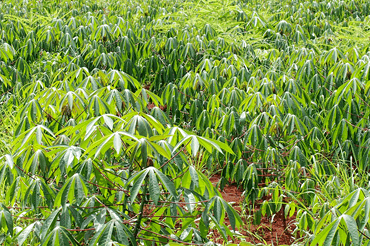- by AATF Africa
The Cassava Mechanisation and Agro-processing Project (CAMAP) has opened a new world of opportunity for many cassava farmers in Osun state, Nigeria. One of these farmers is Mrs Kikelomo Amusan who never thought that at any given day in her life she would ever cultivate anything in excess of one acre of the cassava crop. However, all this changed when CAMAP activities kicked off in the state in May 2013.
Mrs Amusan was fortunate to be among the first 50 beneficiaries to participate in the Project after adequately satisfying the elaborate selection criteria which included ownership of one hectare of well stumped land with a good access road; and willingness to contribute both in kind and in cash for weeding and any other activity such as firebreak clearing. She was very excited to have been selected since she has been leasing a one hectare farm for a number of years and could see great prospects with participation in the Project.
Everything was going well for her since all the necessary inputs for cassava growing which included quality stem cuttings, fertiliser and pre-emergence herbicide were availed by the project on time. It was not until when the ploughing tractor was deployed to her farm that everything turned against her. Her landlord decided to block her from accessing the farm. She tried by all means to request the landlord to allow her continue preparing the land but her pleas fell on deaf ears.
Her misfortune did not dampen her resolve to participate in the Project activities. She immediately decided to move on and look for another piece of land. However, the new piece of land she found required a lot of work to prepare as it was near virgin land after lying fallow for over six years. It was overgrown with bushes and shrubs big enough for charcoal production. She immediately swung to action and by the time she was through with land clearing, she had paid Naira 26,000. The process included clearing a road wide enough to allow for the movement of equipment into her farm which is about 200 metres off the road. By this time all the other participating farmers land had already been ploughed and harrowed and planting was underway. This meant that she had to look for a tractor to plough her land since the National Centre for Agricultural Mechanisation, one of the Project, who are providing the ploughing and harrowing tractors had already returned them to their station in Ilorin, Kwara state. This posed another seemingly insurmountable hurdle to her efforts. Had it not been for the quick intervention of the Cabesi- the area traditional ruler, who sourced another tractor for her, Mrs Amusan could not have realised her dream.
As if that was not enough, by the time land preparation was over, all the planting materials that had been delivered to her initial farm had dried up. She had to move with speed and obtain fresh cassava cuttings if she was to catch-up since planting in the other 49 farms had already been completed. Luckily she managed to get some materials which were not of as good quality as the ones used by other farmers. Despite all the tribulations, her land was planted on 20 May 2013 and Mrs Amusan cannot hold back her joy as she watches her flourishing and healthy cassava crop grow. She looks forward to the day a tractor drawn cassava harvester will drive into her farm to reap what she painfully sowed.
This is a true story of resilience and fortitude. If all the farmers were as determined as Mrs Amusan, Africa would have enough cassava for her consumption and the export market.








































































